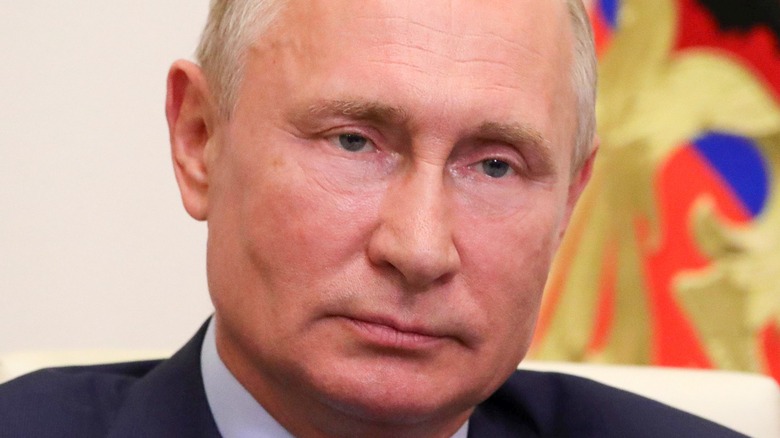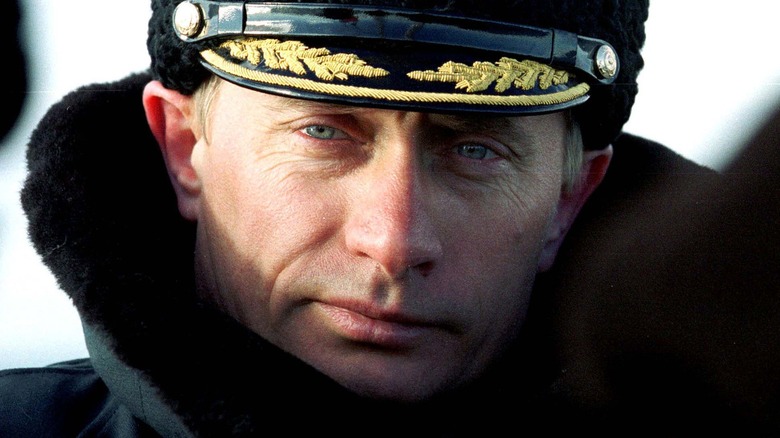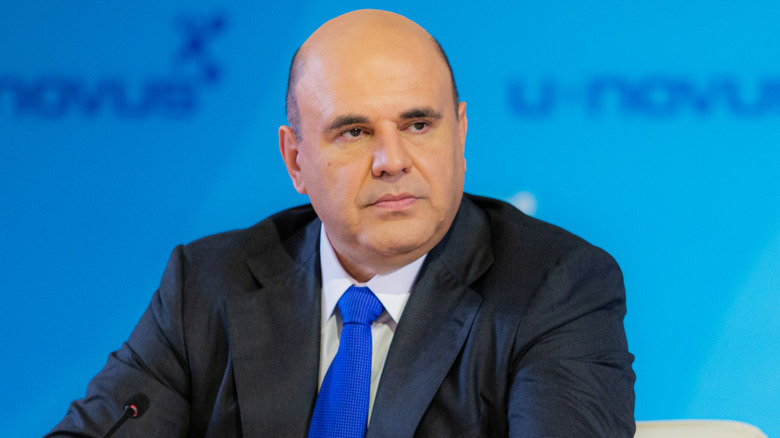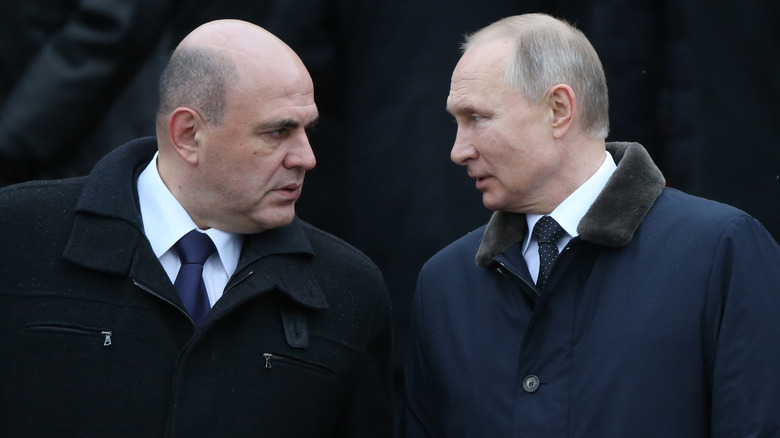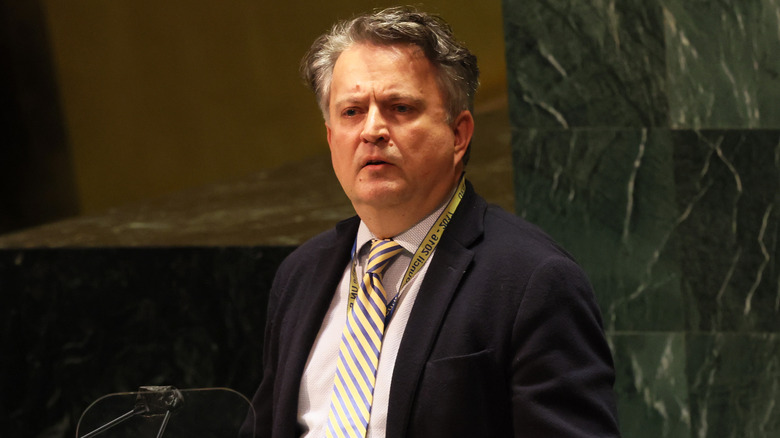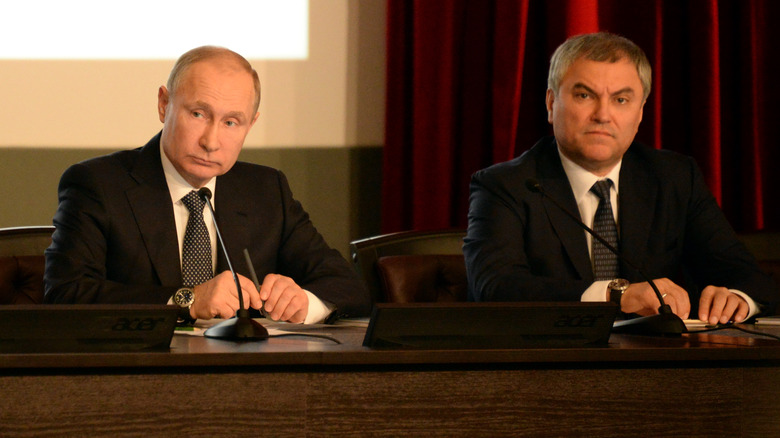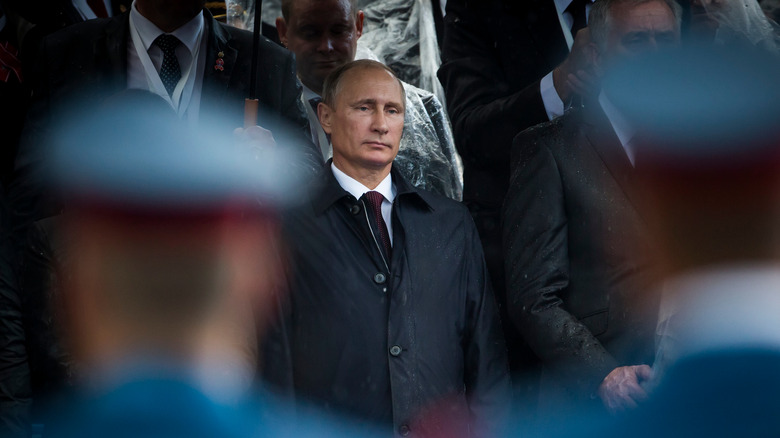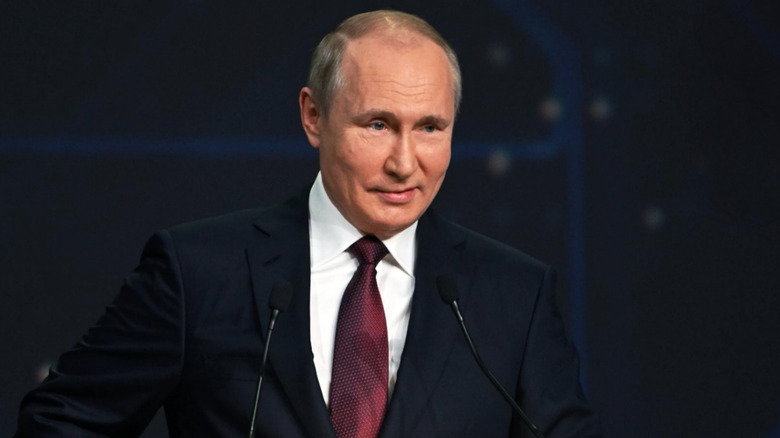Here's What Happens In Russia If Vladimir Putin Dies In Office
Since 1999, Vladimir Putin has been in significant leadership positions within Russia. His homeland approval metrics were steadily rising ahead of his long-anticipated invasion of Ukraine, which took place in February 2022 — though history suggests that they won't remain so positive in the fallout of the attack, per PBS News Hour. Despite whatever may happen in the polls, it's entirely possible that the controversial politician will remain the Russian president for almost the rest of his life: In April 2021, a 68-year-old Putin "signed a law that will allow him to run for the presidency twice more in his lifetime, potentially keeping him in office until 2036," according to The Guardian.
Regardless of how the Russian population feels during those elections, it's been shown that elections in the country tend to be full of "irregularities," per CNN, with experts telling the outlet that the 2018 election in particular was "overly controlled," creating "an uneven playing field" in favor of Putin. Basically? The likelihood of Putin remaining in power until he eventually cannot be president anymore or until his death is fairly high. But if the latter scenario played out, what would the Russian government do in the event of their longtime leader's passing?
Here's what happens in Russia if Vladimir Putin dies in office.
The Russian press doesn't talk about their leaders' health
Holding the health of their leaders close to the chest has been the way Russian authorities and its media have handled things since the early 20th century. The only post-monarchy leader whose health was regularly spoken about publicly was Vladimir Lenin, who came to power after the fall of the Czars. In the days of Lenin, there were public news bulletins frequently updating the people on his health, according to BBC News.
Rumors surrounding the health of Boris Yeltsin, who was the Russian president just before Vladimir Putin, swirled for years, but were never reported by the authorities to the press. This type of hearsay is often what Russian citizens have to go on when it comes to their leaders' condition. So when Putin was spotted noticeably limping back in the fall of 2012, it became headline news everywhere. Per The Atlantic, the Kremlin swiftly denied reports that Putin's "health problem" led to the cancellation of various meetings and events around this time.
Putin's physical and mental health again became a topic of speculative conversation following Russia's invasion of Ukraine in February 2022. The Los Angeles Times reports that experts had seen a significant change in his looks in more recent years — the outlet described him as appearing "puffy-faced" and walking "stiffly" — as well as a "fundamental personality shift." However, given the history of death announcements, it's likely that Russian authorities would not confirm anything about Putin's health condition until he has already died.
Vladimir Putin technically has a successor
Vladimir Putin initially became Russia's acting president after serving as prime minister under the leadership of Boris Yeltsin, who resigned in December 1999. Per The Bulwark, the country's Constitution states that the same situation would occur if Putin died while still in office. However, it's unlikely that a transition of power to Prime Minister Mikhail Mishustin would be peaceful — and that's apparently on purpose.
"It's by design," an anonymous intelligence official in Western Europe, who has worked intimately in maintaining relationships with Russia, told Insider in 2020. "Having a political heir is an invitation to a coup in most authoritarian structures like organized crime. And letting that heir build their own independent political and power base through legitimate authority almost guarantees one." The source suggested that what would come of Putin's death, should it happened while in office, would be akin to the 2017 film "The Death of Stalin" — meaning, people would fight over the replacement, which would take permanence in an election three months after such a transition from president to the prime minister.
In 2019, Alexander Morozov posited in The Moscow Times that there were five most likely successors to Putin: Sergei Sobyanin (Mayor of Moscow), Alexei Kudrin (the Accounts Chamber chairman), Sergei Chemezov (CEO of Rostec), Igor Shuvalov (the State Development Corporation chairman), and Dmitry Medvedev (the Security Council of Russia chairman, as well as former Russian prime minister and former president from 2008 to 2012). It's worth noting that this list came before Mishustin became prime minister in 2020.
Prime Minister Mikhail Mishustin is a technocrat
With a background in taxes and no political work to be seen, the current Russian Prime Minister Mikhail Mishustin is a technocrat, which means he is an expert in his field but not a career politician. Before being named prime minister in 2020 following Dmitry Medvedev's resignation, Mishustin "worked in tax collection" and eventually "headed the Federal Tax Service," per DW. He's also run a Russian investment company, has an educational background in engineering, and once worked in IT to help move technology forward in Russia.
After economic sanctions were placed on Russia following its invasion of Ukraine in February 2022, Mishustin announced "daily meetings" to try and lessen the damage to the Russian economy, according to CNN. Two of the almost immediate effects included the ruble hitting a "record low" compared to the U.S. dollar, as well as the stock exchange closing in response on February 28 — it is still closed, as of this writing.
Despite initial thoughts of Mishustin as a simple leadership placeholder, some experts have seen his star rise, with minds changing during the COVID-19 pandemic, as The Moscow Times noted in 2021. According to the head of the Carnegie Moscow Center's Russian Domestic Politics and Political Institutions Program, Andrei Kolesnikov, "After Mishustin, recovering from [the coronavirus], calmly returned to his chair, all speculation about his stability ceased. And political observers went to the other extreme — they began to consistently announce the head of the cabinet as Putin's successor."
International leaders are not holding back against Putin
Invading Ukraine is an attack that some have seen as Vladimir Putin's attempt to cling to his power. At least, that's what "This is Not Propaganda: Adventures in the War Against Reality" author Peter Pomerantsev had to say in an article written for Time. He sees Putin's invasion as a means for the Russian leader "to turn back time" as he gets older and, therefore, closer to the natural end of his life.
Understandably, Ukrainian officials are also not holding back in their discourse around the wellbeing of Putin. Likening the Russian leader's destruction of their homeland to World War II in an emergency General Assembly session at the United Nations, Ukrainian ambassador Sergiy Kyslytsya then commented on the end of Adolf Hitler's dictatorship (via Newsweek): "If [Putin] wants to kill himself, he doesn't need to use nuclear arsenal. He has to do what the guy in Berlin did in a bunker in [April] 1945."
That wasn't the first time Kyslytsya publicly stood up against Russian leadership. During a U.N. Security Council meeting days before — led somewhat ironically by Russian ambassador Vasily Nebenzya as part of the council's "monthly rotation," according to HuffPost – news of the Ukrainian invasion broke. "There is no purgatory for war criminals. They go straight to hell, Ambassador," Kyslytsya told Nebenzya, who "denied" Russia's "aggressi[on]" toward Ukraine, per the outlet.
Could Russia 'collapse' if Vladimir Putin dies in office?
Having undone much of what former Russian President Boris Yeltsin did to build up the country's democratic systems, Vladimir Putin has made himself a "new" kind of Russian "tsar," according to Michael Rubin at 1945.
"Here's the problem: While every democratic wakes up each morning knowing when his or her term will end; every dictator wakes up knowing that today could be his last," Rubin wrote. "Whereas Yeltsin left Putin a structure on which to operate and build, Putin will leave no system on which a successor — even if he appoints one — can operate. When Putin dies, Russia will descend into chaos." As Rubin added, the country's potential "collapse" could be likely, in part, because of Putin's "consolidat[ion]" of "power," as well as "cash, property and other assets."
Meanwhile, Putin's former deputy chief of staff, Vyacheslav Volodin, said back in 2014 (via The Moscow Times), "There is no Russia today if there is no Putin." But it isn't just the governmental structure of Russia that Volodin could have been referring to. After all, as The Economist points out, Russia is a country covering almost 200 nationalities of people. The outlet recalls that the reason the Soviet Union fell was that it got too big and exhausted its funds, which led to "local elites" no longer wanting to be part of a country that was broke.
Experts believe 'pseudo-Cossacks' could take up power
Dr. Robert E. Berls Jr., who's a senior advisor for Russia and Eurasia at the Nuclear Threat Initiative, considers a Dostoevsky-esque dystopian reality for a post-Vladimir Putin Russia. He draws from a scenario outlined by PolitSovet editor Aleksey Shaburov, in which Putin's "pseudo-Cossacks" would take up power (and arms) in Russia. The pseudo-Cossacks straddle the line between "'official powers-that-be and bandits,'" per Shaburov, with Berls paraphrasing his assertion that this would lead to "violence against minorities they do not like" and ultimately "chaos in the country."
These pseudo-Cossacks were used as patrols in Belarus that were referred to by Russian officials as "voluntary patrols" in 2018, according to the Eurasia Review. Pseudo-Cossacks are a group of militias that Putin has apparently long been using for "increasingly sordid tasks" while "pump[ing]" them up with "enormous sums of money" and support via "state-controlled media" networks, per The Jamestown Foundation. The foundation also noted that referring to them as "Cossacks" was an intentional means of not only taking advantage of the "negative image" of the term, but also bringing back this "practice" from before the 1917 Russian Revolution.
Because of their ambiguous role within the Russian state, the group isn't necessarily well-controlled, notes Berls. An armed militia that is funded by the government while also not having clear delineations within it could be "dangerous," The Jamestown Foundation reports, particularly as there has already been coverage of the pseudo-Cossacks attacking anti-Putin protestors, potentially signifying where their alliance lies.
A succession crisis is nothing new for Russia
Russia has a phrase for times of tumultuous transition: "Time of Troubles." This could happen if a leader died suddenly or there was an issue coming to an agreement around who should take charge. As Fiona Hill posited in Politico in 2015, Vladimir Putin's death could bring in one such period.
Many of the institutions created to support the line of succession as offered by Russia's Constitution have essentially been dismantled by Putin, Hill noted, which all but ensures a rocky transition of power. "This suggests that the old Russian story of a vicious scramble within the Kremlin for who gets the next turn on top will be played out again," she wrote. "In the new world of globalized social media, we will likely glean our snippets of information about the inner machinations of the succession from Twitter rather than from palace intrigue, or from glimpses of who is standing on top of Lenin's Mausoleum, as in the Cold War days."
This history of succession issues is made even more difficult by Russia's vast wealth, Leon Aron wrote for The Wall Street Journal in 2007, which has been eclipsed by the wealth of 2022 Russia — though it does not trickle down. Not only is the wealth held by an elite few, so too is the power. "With the deliberate weakening of the mediating institutions of democracy, the center of political gravity in Putin's Russia has shifted to the very top, making the Kremlin responsible for anything that goes wrong anywhere in the country," Aron wrote.

